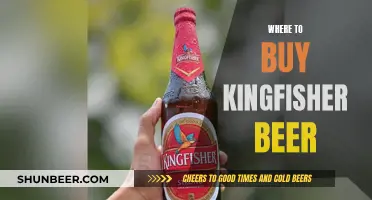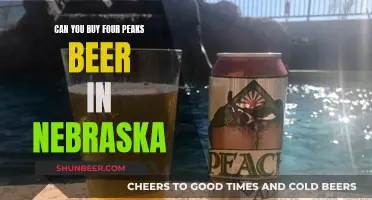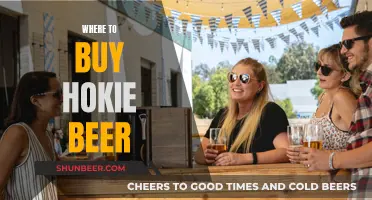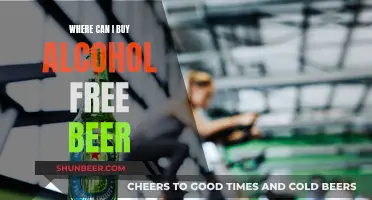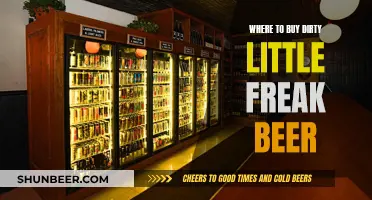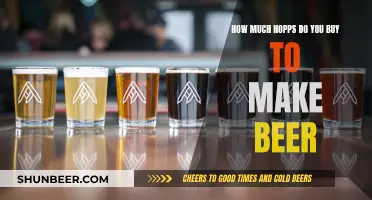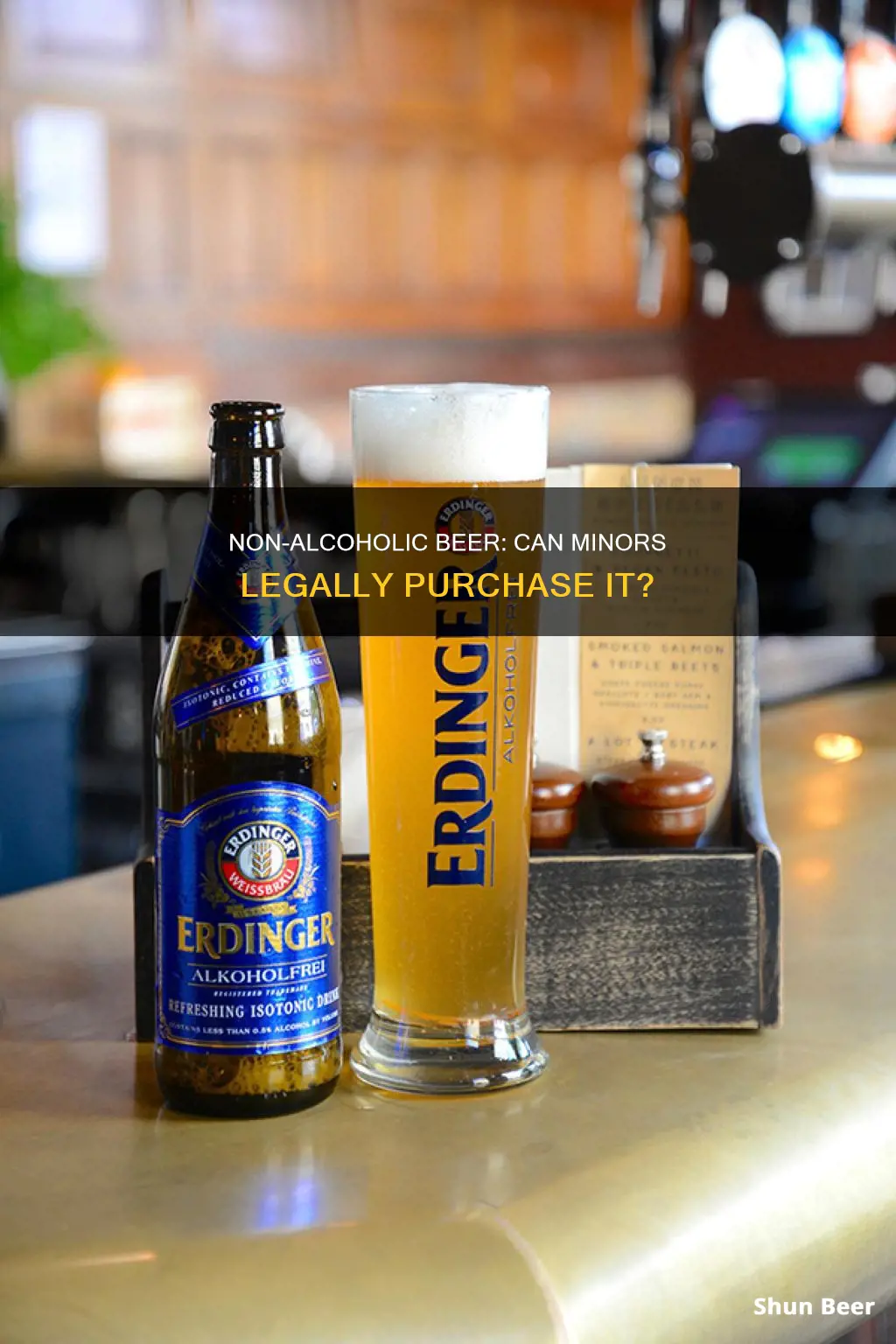
In the UK, non-alcoholic beverages are legally defined as those containing less than 0.5% alcohol by volume (ABV). As such, these drinks can be purchased by individuals under the age of 18. However, many pubs, bars, and retailers still operate a Challenge 25 policy, requiring identification for anyone who appears under 25, even when purchasing non-alcoholic beverages. This is done to avoid confusion and inadvertently selling alcohol to minors, as the packaging and labeling of non-alcoholic beers can closely resemble their alcoholic counterparts. While not legally required, many establishments view this as a responsible business practice to prevent underage drinking and maintain their reputation.
| Characteristics | Values |
|---|---|
| Legality of children buying non-alcoholic beer in the UK | No laws prohibiting minors from purchasing non-alcoholic beer |
| UK drinking laws | Under the Licensing Act 2003, drinks below 0.5% ABV are not legally considered "alcohol" and can be purchased by individuals under the age of 18 |
| Retailers' policies | Many pubs, bars, and retailers operate a "Challenge 25" policy, requiring ID for anyone who appears under 25, even for non-alcoholic drinks |
| Health implications | Pediatricians warn that allowing children to consume non-alcoholic beer may normalize drinking behavior and increase the risk of future alcohol-related issues |
| Parental perspectives | Some parents believe that offering non-alcoholic drinks in moderation can help normalize responsible drinking habits, while others express concerns that it may encourage earlier interest in alcohol |
| Supermarkets' policies | Major supermarkets in the UK, including Tesco, Waitrose, and Asda, enforce the Challenge 25 rule and require ID for non-alcoholic beer purchases |
| Reasons for restrictions | To avoid promoting alcohol to children and to make it easier to enforce rules regarding alcoholic drinks |
What You'll Learn

UK drinking laws and their contradictions
The UK's drinking laws can be confusing, especially when it comes to the sale of non-alcoholic drinks to minors. While there are no laws prohibiting minors from purchasing or consuming non-alcoholic alternatives, the potential risks to children's health have sparked debate among experts and parents.
The Law
Under the Licensing Act 2003, any drink containing less than 0.5% alcohol by volume (ABV) is not legally considered "alcohol". This means that individuals under 18 can buy these drinks. However, this has led to contradictions in practice, with many pubs, bars, and retailers still opting to ID customers who appear under 25, even when purchasing non-alcoholic beverages.
The Contradictions
The first contradiction lies in the practical application of the law. While the law states that drinks under 0.5% ABV are not subject to the same restrictions as alcoholic drinks, many establishments treat alcohol-free drinks the same as their alcoholic counterparts. This is done to avoid promoting alcohol to minors and to make it easier to enforce rules regarding alcoholic drinks. After all, the packaging and taste of non-alcoholic beer are very similar to regular beer, and they are often produced by the same companies.
The second contradiction arises from the fact that while non-alcoholic drinks are legally accessible to minors, many retailers and supermarkets still prohibit their sale to this age group. This is due to ethical concerns about promoting alcohol to children and the practical challenges of distinguishing between alcoholic and non-alcoholic drinks, especially in busy bars and restaurants.
Health Implications
The potential health implications of non-alcoholic drinks for children are also a point of contradiction. Paediatricians warn that allowing children to consume non-alcoholic beer may normalise drinking behaviour and increase the risk of future alcohol-related issues. On the other hand, some parents believe that offering these drinks in moderation can help normalise responsible drinking habits.
Final Thoughts
In conclusion, while the UK's drinking laws state that minors can purchase non-alcoholic drinks, the contradictions in practice and the ongoing debate about potential health implications create a confusing situation for consumers and retailers alike. Each retailer must decide how to interpret and apply the law, resulting in inconsistencies across the country.
Best Beer Stores in Connecticut
You may want to see also

Health implications for children
In the UK, non-alcoholic beverages are defined as those containing less than 0.5% alcohol by volume (ABV). These drinks can be purchased by individuals under the age of 18, as they are not legally considered "alcohol". However, the potential health implications for children and adolescents who consume non-alcoholic beer are a topic of concern for experts and parents.
Non-alcoholic beer typically contains trace amounts of alcohol, ranging from 0% to 0.5% ABV. While these low levels of alcohol are not expected to cause immediate intoxication or toxicity in children, there are other health risks to consider.
Firstly, normalising the consumption of non-alcoholic beer at a young age may increase the risk of future alcohol-related issues. Pediatricians warn that allowing children to drink non-alcoholic beer can make them more interested in consuming alcoholic beverages when they are older. Research supports this claim, showing that teens who have consumed non-alcoholic beer exhibit a higher interest in alcoholic drinks. This correlation suggests that normalising beer drinking at a young age could lead to earlier experimentation with alcohol.
Secondly, non-alcoholic beer may confuse children who do not fully understand the difference between alcoholic and non-alcoholic drinks. The packaging and branding of non-alcoholic beer often closely resemble their alcoholic counterparts, making it difficult for children to distinguish between the two. This confusion could potentially lead to dangerous consequences if a child accidentally consumes an alcoholic beverage, thinking it is non-alcoholic.
Additionally, non-alcoholic beer is not nutritionally beneficial for children. It contains calories, carbohydrates, and sugar, similar to sodas and other unhealthy drinks. Therefore, it is not the best choice for children in terms of promoting overall physical health.
Furthermore, genetic and environmental factors can also influence the development of substance use disorders. If there is a family history of addiction or substance misuse, introducing the ritual of drinking beer, even non-alcoholic beer, could be risky. Normalising alcohol use at a young age, especially for those with a genetic predisposition, may increase their risk of developing a substance use disorder.
While the immediate health impact of non-alcoholic beer on children may be minimal, there are potential long-term consequences. The normalisation of drinking behaviour and the increased interest in alcoholic beverages later in life are concerning outcomes that parents and society should consider when deciding whether to allow children to consume non-alcoholic beer.
Estrella Jalisco Beer: Where to Buy and Enjoy It
You may want to see also

Parental perspectives on non-alcoholic beer
In the UK, the Licensing Act 2003 states that any drink containing less than 0.5% alcohol by volume (ABV) is not legally considered "alcohol". This means that non-alcoholic beer can be purchased by individuals under the age of 18. However, the decision to allow children to drink non-alcoholic beer is a controversial topic among parents.
Some parents believe that offering non-alcoholic beer to their children in moderation and in appropriate contexts, such as family celebrations, can help normalise responsible drinking habits. They argue that it can teach children about drinking in a controlled and safe environment. Additionally, non-alcoholic beer can be a good alternative for children who are curious about alcohol, as it allows them to experience the taste and ritual of drinking without the intoxicating effects of alcohol.
On the other hand, many parents express concerns that exposing children to non-alcoholic beer may encourage an earlier interest in alcohol and lead to increased consumption of alcoholic beverages later in life. They worry that the taste, branding, and marketing of non-alcoholic beer may appeal to minors and normalise drinking behaviour, increasing the risk of future alcohol-related issues. Paediatricians support this view, warning that allowing children to consume non-alcoholic beer may inadvertently promote alcohol consumption and increase the likelihood of negative consequences associated with alcohol use.
While there are no laws prohibiting minors from purchasing or consuming non-alcoholic beverages in the UK, the potential risks and benefits remain a topic of debate. Ultimately, the decision to allow children to drink non-alcoholic beer falls to the parents, who must weigh the potential benefits against the potential risks and make an informed choice.
Best Places to Buy Barq's Frozen Root Beer Float
You may want to see also

Legal regulations and age restrictions
In the UK, the Licensing Act 2003 defines "alcohol" as drinks containing more than 0.5% alcohol by volume (ABV). Therefore, non-alcoholic beverages with an ABV of 0.5% or lower are not legally considered alcohol and can be purchased by individuals under the age of 18. There are no laws prohibiting minors from consuming these drinks.
However, despite the legal age limit, many pubs, bars, and retailers still implement a "Challenge 25" policy. This means they request identification from customers who appear under 25 years old, even when purchasing non-alcoholic or low-alcoholic drinks with an ABV below 0.5%. This policy is not legally mandated but is adopted as a responsible business practice to prevent underage drinking and uphold the establishment's reputation. It also helps avoid confusion and reduces the risk of inadvertently selling alcohol to minors, as non-alcoholic beers often have similar packaging to their alcoholic counterparts.
While it is not illegal for minors to buy non-alcoholic beer in the UK, some retailers choose to prohibit these sales. This decision is often based on ethical considerations and practicality. Retailers aim to avoid promoting alcohol to minors and find it more practical to have a single policy for all alcoholic beverages, rather than differentiating between non-alcoholic and low-alcoholic drinks. Additionally, they want to prevent staff from constantly checking the ABV of drinks and potentially making errors.
Ultimately, the decision to sell non-alcoholic beer to minors is at the discretion of the retailer or establishment. While there is no legal restriction, some choose to restrict these sales to uphold responsible business practices and protect children from the potential dangers of alcohol.
When Can You Buy Beer in West Virginia?
You may want to see also

Retailers' policies and practices
In the UK, the Licensing Act 2003 states that any drink containing less than 0.5% alcohol by volume (ABV) is not legally considered "alcohol". This means that non-alcoholic beer can be purchased by individuals under the age of 18. Despite this, many retailers still choose to operate a "Challenge 25" policy, requiring identification for anyone who appears under 25, even when purchasing non-alcoholic or low-alcoholic beverages below 0.5% ABV.
Some retailers also restrict the sale of non-alcoholic beer to minors for practical reasons. Having a single policy for all alcoholic beverages, regardless of their ABV, is simpler than having different rules for alcoholic and non-alcoholic drinks. It can be challenging for staff to constantly check the ABV of drinks, especially when the information on the packaging is not always clear.
Additionally, some retailers believe that selling non-alcoholic beer to minors could reflect poorly on their company. These beverages are primarily targeted at adults, such as designated drivers or those choosing to stay sober. Allowing minors to purchase them could be seen as promoting alcohol to children.
On the other hand, some parents argue that offering non-alcoholic beverages in moderation and appropriate contexts, such as family celebrations, can help normalise responsible drinking habits for their children.
Ultimately, in the UK, the decision to sell non-alcoholic beer to minors is left to the discretion of the retailer. While there is no legal restriction, many retailers choose to restrict sales to avoid promoting alcohol to minors, simplify enforcement of alcohol rules, and maintain their reputation as responsible businesses.
Thanksgiving Beer Run: Tennessee's Alcohol Laws Explained
You may want to see also


